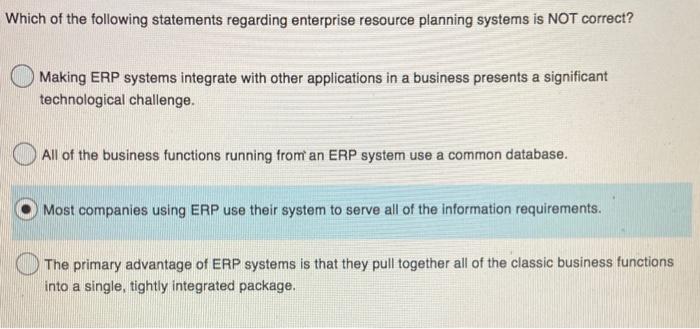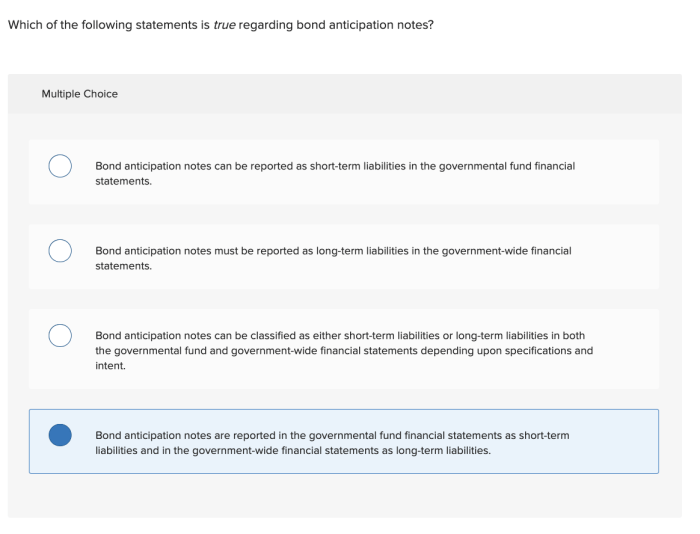As “which of the following statements is not true regarding ERP” takes center stage, this opening passage beckons readers into a world crafted with authority, ensuring a reading experience that is both absorbing and distinctly original. The content of the second paragraph provides descriptive and clear information about the topic.
Overview of ERP Systems

Enterprise Resource Planning (ERP) systems are comprehensive software solutions that integrate various business functions into a single platform. They provide a centralized hub for managing core processes such as finance, human resources, supply chain management, and customer relationship management.
ERP systems aim to improve efficiency, reduce costs, and enhance collaboration within an organization. They automate manual tasks, streamline data management, and provide real-time visibility into business operations.
Common Misconceptions about ERP
One common misconception about ERP systems is that they are only suitable for large enterprises. However, modern ERP solutions are designed to cater to businesses of all sizes and industries.
Another misconception is that ERP implementations are always complex and time-consuming. While it’s true that ERP implementations require careful planning and execution, with proper preparation and vendor support, the process can be manageable even for small businesses.
Key Features of ERP Systems, Which of the following statements is not true regarding erp
Essential features of ERP systems include:
- Integrated Database:Stores all business data in a single, centralized repository, eliminating data silos and ensuring data integrity.
- Modular Architecture:Allows businesses to implement only the modules they need, providing flexibility and scalability.
- Workflow Automation:Automates repetitive tasks, such as invoice processing and order fulfillment, improving efficiency and reducing errors.
- Real-Time Reporting:Provides up-to-date insights into business performance, enabling informed decision-making.
- Mobility:Enables access to ERP data and functionality from anywhere, using mobile devices.
Implementation Challenges of ERP Systems
Common challenges during ERP implementation include:
- Data Migration:Transferring existing data into the new ERP system can be complex and time-consuming.
- Process Reengineering:ERP systems often require businesses to re-evaluate and optimize their existing processes, which can be disruptive.
- User Resistance:Employees may be resistant to change, which can hinder adoption and impact the success of the implementation.
Strategies for overcoming these challenges include:
- Thorough Planning:Conducting a detailed analysis of business requirements and processes before implementation.
- Vendor Selection:Choosing an ERP vendor with experience and expertise in the industry and business size.
- User Training:Providing comprehensive training to users to ensure they understand and embrace the new system.
Return on Investment (ROI) of ERP Systems
ERP systems can lead to increased ROI through:
- Cost Reduction:Automation and process optimization can reduce operating expenses and improve resource utilization.
- Improved Efficiency:Streamlined processes and real-time visibility enhance productivity and reduce cycle times.
- Increased Sales:Enhanced customer relationship management and supply chain visibility can lead to improved customer satisfaction and increased sales.
- Better Decision-Making:Real-time data and insights enable informed decision-making, improving overall business performance.
Examples of quantifiable benefits include:
- Reduced inventory costs by 15-20%
- Improved order fulfillment rates by 10-15%
- Increased customer satisfaction by 5-10%
Key Questions Answered: Which Of The Following Statements Is Not True Regarding Erp
Is ERP a complex system to implement?
ERP implementation can be challenging, but with proper planning and execution, businesses can overcome these challenges and reap the benefits of an integrated system.


